免疫学 特异性免疫与免疫细胞 (英文)
免疫学(全套课件475P)
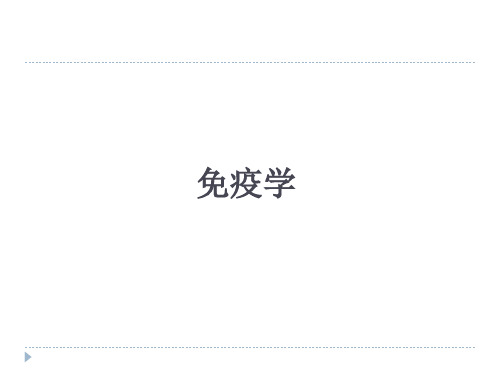
异常 ??
防御功能低下或缺失: 反复感染
14
2020/3/11
2、自身稳定(Homeostasis) 指机体具有清除衰老和破坏的组织细胞的
一种功能。 维持机体的正常生理平衡,保证机体组织
细胞进行正常生理活动。
自身稳定功能失调或异常: 自身免疫性疾病!
15
2020/3/11
——机体对病原微生物(细菌,病毒)及其 有害产物(毒素)的侵入所引起的发病,具 有抵抗力。(Jenner and Pasteur)
—5 5—
2020/3/11
•现代的“免疫”概念
机体识别(区分)自身成分和异己物质, 产生一系列特定的应答过程,最后排除异 物,对自身组织形成耐受,以维持内环 境稳定的一种生理功能。
—20—
(二)特异性免疫(specific immunity)
在动物长生活过程中,机体感染了某种病原体 或接种过某种疫苗后,由于机体与病原体的直接的相互作 用,使其产生一种具有明显针对性的免疫,这种免疫称为 特异性免疫,也称获得性免疫。特异性免疫的主要功能是 识别非自身和自身的抗原物质,并对它们产生免疫应答, 从而保证机体内环境的稳定状态。
四、免疫的分类
免疫
非特异性免疫
天然自动免疫 自动免疫
人工自动免疫
特异性免疫
天然被动免疫 被动免疫
人工自动免疫
(一)非特异性免疫(nonspecific immunity)
凡在生物长期进化过程中形成,属于先天即有、 相对稳定、无特殊针对性的对付病原体的天然抵抗能力, 称为非特异性免疫,也称先天免疫、固有免疫。
1、非特异性免疫功能任何动物都有,受遗传基因控制, 非常稳定。
医学免疫学名词解释.
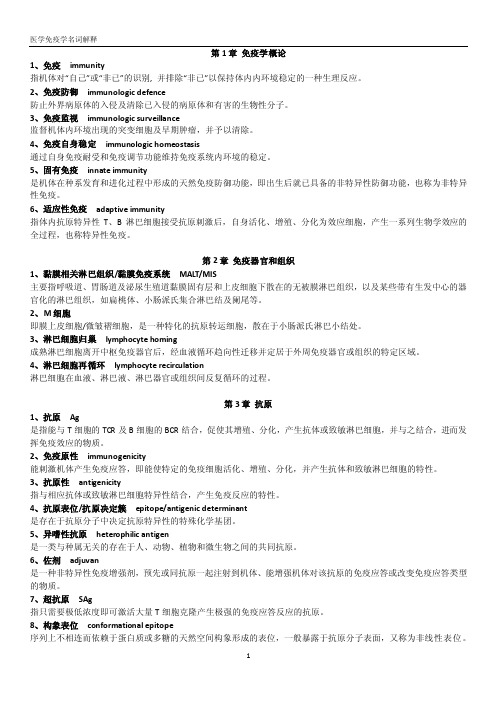
第1章免疫学概论1、免疫immunity指机体对“自己”或“非已”的识别, 并排除“非已”以保持体内内环境稳定的一种生理反应。
2、免疫防御immunologic defence防止外界病原体的入侵及清除已入侵的病原体和有害的生物性分子。
3、免疫监视immunologic surveillance监督机体内环境出现的突变细胞及早期肿瘤,并予以清除。
4、免疫自身稳定immunologic homeostasis通过自身免疫耐受和免疫调节功能维持免疫系统内环境的稳定。
5、固有免疫innate immunity是机体在种系发育和进化过程中形成的天然免疫防御功能,即出生后就已具备的非特异性防御功能,也称为非特异性免疫。
6、适应性免疫adaptive immunity指体内抗原特异性T、B淋巴细胞接受抗原刺激后,自身活化、增殖、分化为效应细胞,产生一系列生物学效应的全过程,也称特异性免疫。
第2章免疫器官和组织1、黏膜相关淋巴组织/黏膜免疫系统MALT/MIS主要指呼吸道、胃肠道及泌尿生殖道黏膜固有层和上皮细胞下散在的无被膜淋巴组织,以及某些带有生发中心的器官化的淋巴组织,如扁桃体、小肠派氏集合淋巴结及阑尾等。
2、M细胞即膜上皮细胞/微皱褶细胞,是一种特化的抗原转运细胞,散在于小肠派氏淋巴小结处。
3、淋巴细胞归巢lymphocyte homing成熟淋巴细胞离开中枢免疫器官后,经血液循环趋向性迁移并定居于外周免疫器官或组织的特定区域。
4、淋巴细胞再循环lymphocyte recirculation淋巴细胞在血液、淋巴液、淋巴器官或组织间反复循环的过程。
第3章抗原1、抗原Ag是指能与T细胞的TCR及B细胞的BCR结合,促使其增殖、分化,产生抗体或致敏淋巴细胞,并与之结合,进而发挥免疫效应的物质。
2、免疫原性immunogenicity能刺激机体产生免疫应答,即能使特定的免疫细胞活化、增殖、分化,并产生抗体和致敏淋巴细胞的特性。
免疫学名词解释
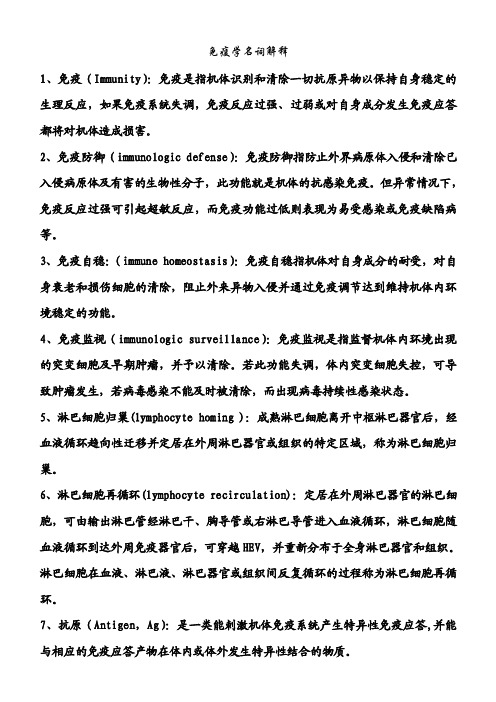
免疫学名词解释1、免疫(Immunity):免疫是指机体识别和清除一切抗原异物以保持自身稳定的生理反应,如果免疫系统失调,免疫反应过强、过弱或对自身成分发生免疫应答都将对机体造成损害。
2、免疫防御(immunologic defense):免疫防御指防止外界病原体入侵和清除已入侵病原体及有害的生物性分子,此功能就是机体的抗感染免疫。
但异常情况下,免疫反应过强可引起超敏反应,而免疫功能过低则表现为易受感染或免疫缺陷病等。
3、免疫自稳:(immune homeostasis):免疫自稳指机体对自身成分的耐受,对自身衰老和损伤细胞的清除,阻止外来异物入侵并通过免疫调节达到维持机体内环境稳定的功能。
4、免疫监视(immunologic surveillance):免疫监视是指监督机体内环境出现的突变细胞及早期肿瘤,并予以清除。
若此功能失调,体内突变细胞失控,可导致肿瘤发生,若病毒感染不能及时被清除,而出现病毒持续性感染状态。
5、淋巴细胞归巢(lymphocyte homing ):成熟淋巴细胞离开中枢淋巴器官后,经血液循环趋向性迁移并定居在外周淋巴器官或组织的特定区域,称为淋巴细胞归巢。
6、淋巴细胞再循环(lymphocyte recirculation):定居在外周淋巴器官的淋巴细胞,可由输出淋巴管经淋巴干、胸导管或右淋巴导管进入血液循环,淋巴细胞随血液循环到达外周免疫器官后,可穿越HEV,并重新分布于全身淋巴器官和组织。
淋巴细胞在血液、淋巴液、淋巴器官或组织间反复循环的过程称为淋巴细胞再循环。
7、抗原(Antigen,Ag):是一类能刺激机体免疫系统产生特异性免疫应答,并能与相应的免疫应答产物在体内或体外发生特异性结合的物质。
2 免疫原性(Immunogenicity):是指抗原能刺激特定的免疫细胞(克隆),使之活化、增殖、分化,产生免疫效应物质(抗体和致敏淋巴细胞)的特性.免疫反应性(Immunoreactivity);也称抗原性(Antigenicity):是指抗原与相应的免疫效应物质(抗体或/和致敏淋巴细胞),在体内体外发生特异性结合的特性. 8、半抗原(hapten):仅有免疫反应性而无免疫原性的物质。
免疫学名词解释完整版

免疫(Immunity): 是对抗原的识别和清除。
其核心是机体识别“自我”与“非我(异己)”、产生免疫应答,以清除“异己”抗原或者诱导免疫耐受,从而维持自身内环境稳定。
免疫学(Immunology): 研究免疫系统结构与功能的学科, 涉及免疫识别、免疫应答、免疫耐受与免疫调节等免疫学的基本科学规律与机制研究;以及免疫机制在相关疾病发生发展中的作用和免疫学技术在疾病诊断、治疗与预防中的应用。
免疫应答(Immune response):指机体免疫系统受抗原刺激后,淋巴细胞特异性识别抗原分子,发生活化、增生、分化或无能、凋亡,进而表现出一定生物学效应的全过程。
免疫反应:指免疫应答过程中所产生的抗体和致敏淋巴细胞与相应抗原特异性结合所发生的反应。
免疫调理:凡是能增强吞噬细胞吞噬功能的就叫免疫调理。
固有免疫:是生物体在长期种系进化过程中形成的一系列防御机制,是机体的第一道防线,也是特异性免疫的基础。
免疫原性:抗原能刺激特异性免疫细胞,使之活化、增殖、分化,最终产生免疫效应物质(抗体和致敏淋巴细胞)。
决定免疫原性的因素:抗原的异物性;抗原的理化性质;宿主的遗传因素、年龄、性别、健康状态;抗原进入机体的剂量、途径、次数以及佐剂。
免疫耐受:是机体的免疫系统接触某种抗原后形成的特异性免疫无应答状态,表现为再次接触同一抗原时,不发生可查见的反应,是一种特殊的免疫应答。
免疫球蛋白:是指具有抗体(antibody, Ab)活性或在化学结构上与抗体相似的一类球蛋白, 主要存在于体液中(分泌型),也可存在于B细胞膜上(膜型)。
(AID)自身免疫病:自身免疫应答并非必然引起自身免疫病,仅当自身免疫应答过强或持续时间过长、以致破坏自身正常组织结构并引起相应临床症状时,才导致自身免疫病。
(IDD)免疫缺陷病(immunodeficiengcy disease,):是由免疫系统先天发育障碍或后天损伤而使免疫细胞的发育、分化、增殖和代谢异常,并导致免疫功能障碍所出现的临床综合征。
动物免疫学 整理
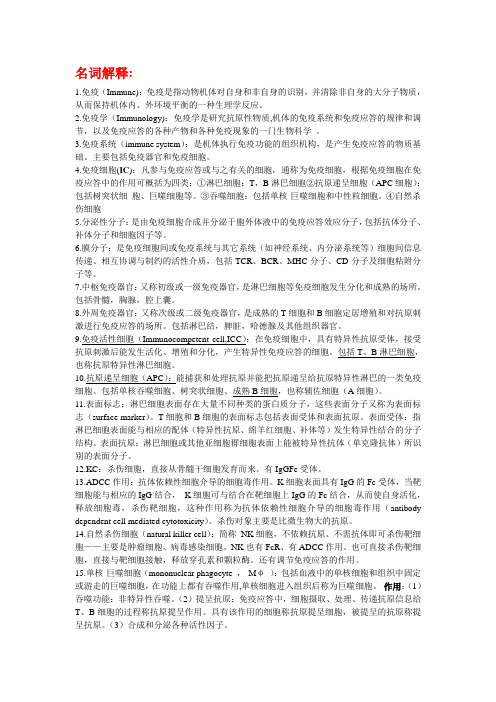
名词解释:1.免疫(Immune):免疫是指动物机体对自身和非自身的识别,并清除非自身的大分子物质,从而保持机体内、外环境平衡的一种生理学反应。
2.免疫学(Immunology):免疫学是研究抗原性物质,机体的免疫系统和免疫应答的规律和调节,以及免疫应答的各种产物和各种免疫现象的一门生物科学。
3.免疫系统(immune system):是机体执行免疫功能的组织机构,是产生免疫应答的物质基础。
主要包括免疫器官和免疫细胞。
4.免疫细胞(IC):凡参与免疫应答或与之有关的细胞,通称为免疫细胞,根据免疫细胞在免疫应答中的作用可概括为四类:①淋巴细胞:T,B淋巴细胞②抗原递呈细胞(APC细胞):包括树突状细胞、巨噬细胞等。
③吞噬细胞:包括单核-巨噬细胞和中性粒细胞。
④自然杀伤细胞5.分泌性分子:是由免疫细胞合成并分泌于胞外体液中的免疫应答效应分子,包括抗体分子、补体分子和细胞因子等。
6.膜分子:是免疫细胞间或免疫系统与其它系统(如神经系统、内分泌系统等)细胞间信息传递、相互协调与制约的活性介质,包括TCR、BCR、MHC分子、CD分子及细胞粘附分子等。
7.中枢免疫器官:又称初级或一级免疫器官,是淋巴细胞等免疫细胞发生分化和成熟的场所。
包括骨髓,胸腺,腔上囊。
8.外周免疫器官:又称次级或二级免疫器官,是成熟的T细胞和B细胞定居增殖和对抗原刺激进行免疫应答的场所。
包括淋巴结,脾脏,哈德腺及其他组织器官。
9.免疫活性细胞(Immunocompetent cell,ICC):在免疫细胞中,具有特异性抗原受体,接受抗原刺激后能发生活化、增殖和分化,产生特异性免疫应答的细胞。
包括T、B淋巴细胞,也称抗原特异性淋巴细胞。
10.抗原递呈细胞(APC):能捕获和处理抗原并能把抗原递呈给抗原特异性淋巴的一类免疫细胞。
包括单核吞噬细胞、树突状细胞、成熟B细胞,也称辅佐细胞(A细胞)。
11.表面标志:淋巴细胞表面存在大量不同种类的蛋白质分子,这些表面分子又称为表面标志(surface marker)。
医学免疫学名词解释及问答总结

1.免疫:免疫指机体识别“自己”与“非己”(self-nonself),对“非己”抗原发生清除、排斥反应,以维持机体内环境平衡与稳定的生理功能,包括免疫防御功能、免疫监视功能和免疫稳定三大功能。
2. 免疫防御(immunologic defence):是针对外来抗原(如微生物或毒素)的一种免疫保护作用,或称为抗感染免疫。
如果免疫应答表现过于强烈,则在清除抗原的同时,也会造成组织损伤,即发生超敏反应(变态反应)。
如免疫应答过低或缺如,则可发生免疫缺陷病。
3.免疫监视(immunologic surveillance):正常情况下,体内的某些免疫细胞能发现并处理(杀伤、消毁)体内经常出现的少量异常细胞。
4.免疫稳定(immunologic homeostasis):正常情况下,机体可经常地清除损伤或衰老的自身细胞,以维持免疫机能在生理范围内的相对稳定性。
1. 抗原:能诱导机体免疫系统发生特异性免疫应答并能与相应应答产物(Ab或致敏淋巴细胞)在体内或体外发生特异性结合的物质。
亦称免疫原.2. 免疫原性:指抗原能刺激特定的免疫细胞,使免疫细胞活化、增殖、分化,最终产生免疫效应物质抗体和致敏淋巴细胞的特性。
3.抗原性:指能与免疫应答产物相互作用起反应的性能。
原称反应原性或免疫原反应性4.半抗原: 只具有抗原性而无免疫原性的物质。
5.完全抗原: 同时具有免疫原性和抗原性的物质。
6.抗原决定族: 是指抗原性物质表面决定该抗原特异性的特殊化学基团,又称表位。
7.共同抗原: 具有共同或相似的抗原表位的不同抗原。
8.异嗜性抗原: 在人不同种属动物植物和微生物细胞表面上存在的共同抗原。
它们之间有广泛交叉反应,与种属特异性无关。
又称Forssman 抗原。
9.超抗原: 只需极低浓度(1-10ng/ml)既可激活大量的T细胞克隆,产生极强的免疫应答效应,但其激活机制与方式有别于常规抗原与有丝分裂原.10.TD-Ag : 胸腺依赖性抗原, 这类抗原需在T细胞辅助才能激活B细胞产生Ab,绝大多数Ag属此类。
免疫

免疫(immunity)是机体识别“自己”, 排除“异己(非己)”过程中所产生的生物学效应的总和,正常情况下是维持内环境稳定的一种生理性防御功能。
免疫学(immunology)研究机体免疫系统结构和功能的独立学科免疫原性(immunogenicity)指能刺激机体产生免疫应答(诱导产生抗体或效应T细胞)的特性。
免疫反应性指与抗体或效应T细胞发生特异性结合的能力。
免疫防御(immune defense)指机体对外来微生物及其毒素的免疫保护作用;应答过强或持续过长→超敏反应;应答过低或缺如→免疫缺陷病。
免疫自稳(immune homeostasis)免疫系统通过调节网络实现免疫系统功能相对稳定;自稳机制发生异常(应答过强或过弱)→自身免疫病。
免疫监视(immune surveillance)指免疫系统识别畸变和突变细胞并将其清除的功能;免疫监视功能异常→肿瘤发生或持续病毒感染。
抗原(antigen) 可被T、B淋巴细胞识别,启动特异性免疫应答,并可与应答产生的抗体和效应细胞特异性结合的物质。
完全抗原:同时具有免疫原性和抗原性的物质。
半抗原(hapten) PG仅具有抗原性而无免疫原性的物质。
载体(carrier) 与半抗原结合而赋予其免疫原性的物质。
抗原决定基(antigenic determinant,AD)又称表位(epitope), 是抗原分子中的特殊化学基团,其性质、数目和空间构型决定了抗原特异性。
是抗原与TCR/BCR抗体特异性结合的基本单位。
超抗原(superantigen,SAg)某些抗原物质,极低浓度即可激活机体2%-20%T细胞克隆产生极强的免疫应答,此抗原为超抗原。
免疫佐剂:指与抗原同时或预先注入机体后,能增强该抗原的免疫原性或改变机体免疫应答类型的物质,简称佐剂。
常用弗氏佐剂。
胸腺依赖性抗原(thymus dependent antigen, TD-Ag):由B细胞表位(半抗原)和T细胞表位(载体)组成,绝大多数蛋白质抗原属此类。
(完整版)医学免疫学名词解释
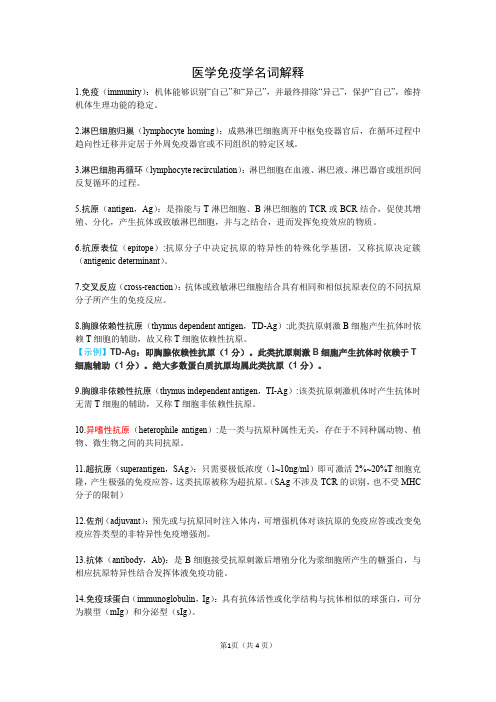
医学免疫学名词解释1.免疫(immunity):机体能够识别“自己”和“异己”,并最终排除“异己”,保护“自己”,维持机体生理功能的稳定。
2.淋巴细胞归巢(lymphocyte homing):成熟淋巴细胞离开中枢免疫器官后,在循环过程中趋向性迁移并定居于外周免疫器官或不同组织的特定区域。
3.淋巴细胞再循环(lymphocyte recirculation):淋巴细胞在血液、淋巴液、淋巴器官或组织间反复循环的过程。
5.抗原(antigen,Ag):是指能与T淋巴细胞、B淋巴细胞的TCR或BCR结合,促使其增殖、分化,产生抗体或致敏淋巴细胞,并与之结合,进而发挥免疫效应的物质。
6.抗原表位(epitope):抗原分子中决定抗原的特异性的特殊化学基团,又称抗原决定簇(antigenic determinant)。
7.交叉反应(cross-reaction):抗体或致敏淋巴细胞结合具有相同和相似抗原表位的不同抗原分子所产生的免疫反应。
8.胸腺依赖性抗原(thymus dependent antigen,TD-Ag):此类抗原刺激B细胞产生抗体时依赖T细胞的辅助,故又称T细胞依赖性抗原。
【示例】TD-Ag:即胸腺依赖性抗原(1分)。
此类抗原刺激B细胞产生抗体时依赖于T 细胞辅助(1分)。
绝大多数蛋白质抗原均属此类抗原(1分)。
9.胸腺非依赖性抗原(thymus independent antigen,TI-Ag):该类抗原刺激机体时产生抗体时无需T细胞的辅助,又称T细胞非依赖性抗原。
10.异嗜性抗原(heterophile antigen):是一类与抗原种属性无关,存在于不同种属动物、植物、微生物之间的共同抗原。
11.超抗原(superantigen,SAg):只需要极低浓度(1~10ng/ml)即可激活2%~20%T细胞克隆,产生极强的免疫应答,这类抗原被称为超抗原。
(SAg不涉及TCR的识别,也不受MHC 分子的限制)12.佐剂(adjuvant):预先或与抗原同时注入体内,可增强机体对该抗原的免疫应答或改变免疫应答类型的非特异性免疫增强剂。
免疫学名词

免疫学名词:免疫(Immunity)的根本概念是:机体识别“自我”与“非我”,产生免疫应答,以清除异己抗原或者诱导免疫耐受,从而维持自身内环境稳定。
固有免疫(Innate Immunity):机体先天存在的免疫力,直接抵抗外来侵袭的免疫系统,又称天然免疫适应性免疫(Adaptive Immunity):机体后天获得的免疫力,能特异性识别和排除抗原的免疫系统,具有记忆性的特点,又称获得性免疫中枢免疫器官(Central lymphoid organ):免疫细胞发生、分化、成熟的场所,即执行生成免疫细胞的功能。
外周免疫器官(Peripheral lymphoid organ):成熟免疫细胞定居和发挥作用的场所,即成熟免疫细胞在这些部位执行应答的功能抗原抗原(Antigen):能与T细胞的TCR及B细胞的BCR特异结合,促使其增殖、分化,产生抗体或致敏淋巴细胞,并与之结合,进而发挥效应的物质。
免疫原性(immunogenicity):抗原刺激机体产生免疫应答的能力。
抗原性(antigenicity):抗原被抗体或TCR特异识别和结合的特性。
抗原表位(epitope):抗原分子中决定抗原特异性的特殊化学基团,又称抗原决定簇。
半抗原(Hapten):能够被TCR或BCR(或抗体分子)识别,但不能独立诱导免疫应答的物质称半抗原。
佐剂(Adjuant):预先或与抗原同时注入体内,可增强机体对该抗原的免疫应答或改变免疫应答类型的非特异性免疫增强性物质。
抗体抗体:是B细胞在抗原刺激后,增殖分化为浆细胞所产生的能与相应抗原特异结合的糖蛋白,是体液免疫的效应分子。
免疫球蛋白(Immunoglobulin,Ig) :具有抗体活性或结构与抗体相似的球蛋白抗体依赖的细胞介导的细胞毒作用(ADCC):指具有杀伤活性的细胞如NK细胞通过其表面表达的Fc受体识别包被于靶抗原上抗体Fc段,直接杀伤靶细胞。
免疫学名词解释
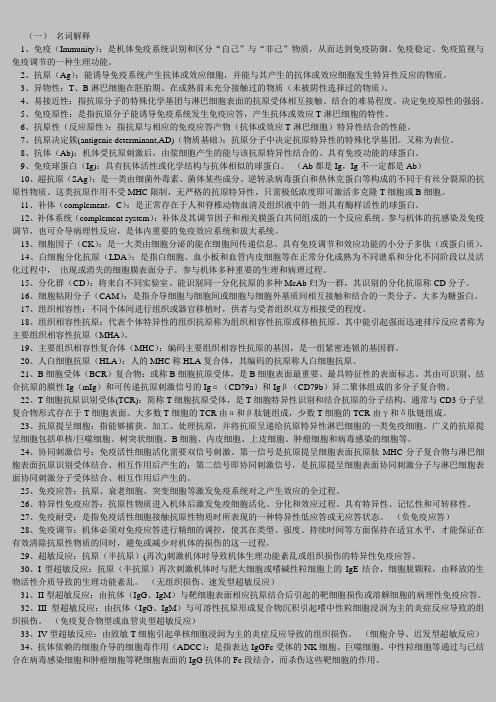
(一)名词解释1、免疫(Immunity):是机体免疫系统识别和区分“自己”与“非己”物质,从而达到免疫防御、免疫稳定、免疫监视与免疫调节的一种生理功能。
2、抗原(Ag):能诱导免疫系统产生抗体或效应细胞,并能与其产生的抗体或效应细胞发生特异性反应的物质。
3、异物性:T、B淋巴细胞在胚胎期、在成熟前未充分接触过的物质(未被阴性选择过的物质)。
4、易接近性:指抗原分子的特殊化学基团与淋巴细胞表面的抗原受体相互接触、结合的难易程度。
决定免疫原性的强弱。
5、免疫原性:是指抗原分子能诱导免疫系统发生免疫应答,产生抗体或效应T淋巴细胞的特性。
6、抗原性(反应原性):指抗原与相应的免疫应答产物(抗体或效应T淋巴细胞)特异性结合的性能。
7、抗原决定簇(antigenic determinant,AD)(物质基础):抗原分子中决定抗原特异性的特殊化学基团。
又称为表位。
8、抗体(Ab):机体受抗原刺激后,由浆细胞产生的能与该抗原特异性结合的、具有免疫功能的球蛋白。
9、免疫球蛋白(Ig):具有抗体活性或化学结构与抗体相似的球蛋白。
(Ab都是Ig,Ig不一定都是Ab)10、超抗原(SAg):是一类由细菌外毒素、菌体某些成分、逆转录病毒蛋白和热休克蛋白等构成的不同于有丝分裂原的抗原性物质。
这类抗原作用不受MHC限制,无严格的抗原特异性,只需极低浓度即可激活多克隆T细胞或B细胞。
11、补体(complement,C):是正常存在于人和脊椎动物血清及组织液中的一组具有酶样活性的球蛋白。
12、补体系统(complement system):补体及其调节因子和相关膜蛋白共同组成的一个反应系统。
参与机体的抗感染及免疫调节,也可介导病理性反应,是体内重要的免疫效应系统和放大系统。
13、细胞因子(CK):是一大类由细胞分泌的能在细胞间传递信息、具有免疫调节和效应功能的小分子多肽(或蛋白质)。
14、白细胞分化抗原(LDA):是指白细胞、血小板和血管内皮细胞等在正常分化成熟为不同谱系和分化不同阶段以及活化过程中,出现或消失的细胞膜表面分子。
常用免疫学名词解释
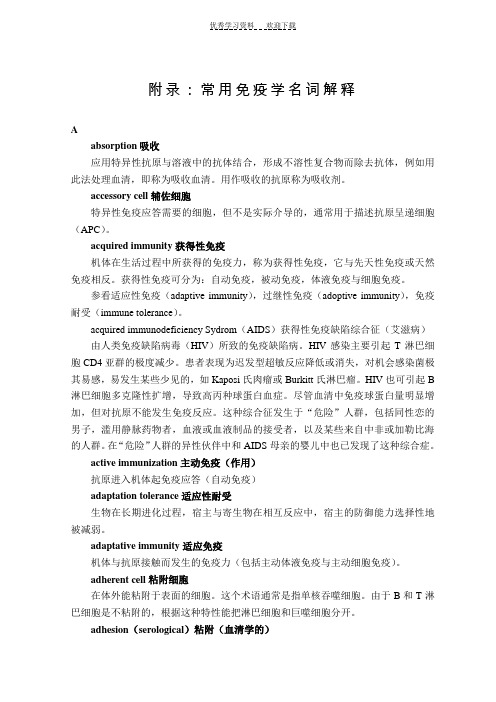
附录:常用免疫学名词解释Aabsorption吸收应用特异性抗原与溶液中的抗体结合,形成不溶性复合物而除去抗体,例如用此法处理血清,即称为吸收血清。
用作吸收的抗原称为吸收剂。
accessory cell辅佐细胞特异性免疫应答需要的细胞,但不是实际介导的,通常用于描述抗原呈递细胞(APC)。
acquired immunity获得性免疫机体在生活过程中所获得的免疫力,称为获得性免疫,它与先天性免疫或天然免疫相反。
获得性免疫可分为:自动免疫,被动免疫,体液免疫与细胞免疫。
参看适应性免疫(adaptive immunity),过继性免疫(adoptive immunity),免疫耐受(immune tolerance)。
acquired immunodeficiency Sydrom(AIDS)获得性免疫缺陷综合征(艾滋病)由人类免疫缺陷病毒(HIV)所致的免疫缺陷病。
HIV感染主要引起T淋巴细胞CD4亚群的极度减少。
患者表现为迟发型超敏反应降低或消失,对机会感染菌极其易感,易发生某些少见的,如Kaposi氏肉瘤或Burkitt氏淋巴瘤。
HIV也可引起B 淋巴细胞多克隆性扩增,导致高丙种球蛋白血症。
尽管血清中免疫球蛋白量明显增加,但对抗原不能发生免疫反应。
这种综合征发生于“危险”人群,包括同性恋的男子,滥用静脉药物者,血液或血液制品的接受者,以及某些来自中非或加勒比海的人群。
在“危险”人群的异性伙伴中和AIDS母亲的婴儿中也已发现了这种综合症。
active immunization主动免疫(作用)抗原进入机体起免疫应答(自动免疫)adaptation tolerance适应性耐受生物在长期进化过程,宿主与寄生物在相互反应中,宿主的防御能力选择性地被减弱。
adaptative immunity适应免疫机体与抗原接触而发生的免疫力(包括主动体液免疫与主动细胞免疫)。
adherent cell粘附细胞在体外能粘附于表面的细胞。
英文版免疫学复习资料

1、Cytotoxic T lymphocytes: 细胞毒性T细胞。
消灭受感染的细胞,可以对产生特殊抗原反应的目标细胞进行杀灭。
细胞毒性T细胞的主要表面标志是CD8。
2、Damage-associated molecular patterns (DAMPs):损伤相关模式分子,是组织或细胞受到损伤、缺氧、应激等因素刺激后释放到细胞间隙或血液循环中的一类物质,可诱导自身免疫或免疫耐受,在关节炎、动脉粥样硬化、肿瘤、系统性红斑狼疮等疾病发生和发展过程中发挥重要作用。
3、Inflammation:发炎反应,指生物组织受到外伤、出血、或病原感染等刺激,激发的生理反应。
其中包括了红肿、发热、疼痛等症状。
受伤组织处会伴有来自血液的白血球和血浆蛋白的增多。
4、Antigen presenting cells(APC):抗原提呈细胞。
指具有摄取、处理及提呈抗原能力的细胞,表面表达的MHCⅡ类分子,能摄取病原体蛋白并将其加工将成短肽段,呈递给T细胞,是获得性免疫的启动者。
5、CD3:分化簇 3。
CD3由6条肽链组成,通过盐桥与TCR相连,形成含有8条肽链的TCR-CD3复合体,参与T细胞的信号转导。
主要用于标记胸腺细胞、T淋巴细胞及T细胞淋巴瘤。
6、MHC restriction :T细胞受体在识别APC细胞或者靶细胞上的MHC分子所提呈的抗原肽时,不仅识别抗原肽,还要识别与抗原肽结合的MHC分子类型,此现象即MHC限制性。
7、Ig domain:免疫球蛋白结构域。
抗体分子具有两个相同的轻链和两条相同的重链。
两个轻链和重链包含一系列重复的,同源的单元,独立地折叠在一个球状体,被称为一种免疫球蛋白结构域。
8、natural killer cells:是一种细胞质中具有大颗粒的细胞,也称NK细胞(NK cell)。
非专一性的细胞毒杀作用。
没有T细胞与B细胞所具的受体,不会进行受体的基因重组。
约占所有淋巴球的细胞的少部分,它可以消灭许多种病源体及多种肿瘤细胞。
医学免疫学名词解释
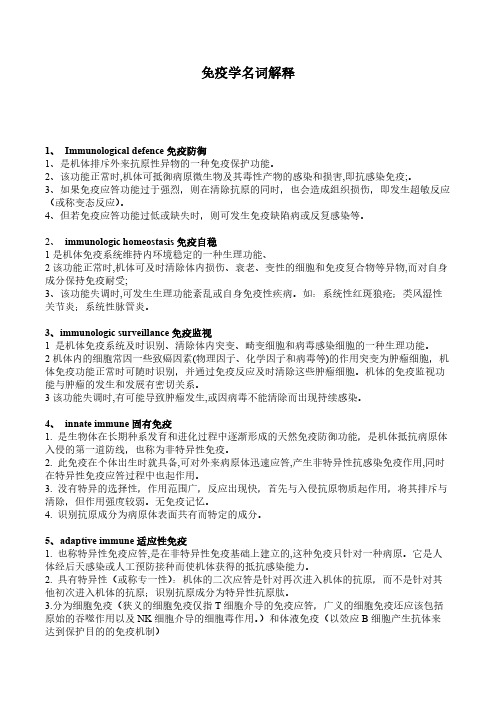
免疫学名词解释1、Immunological defence免疫防御1、是机体排斥外来抗原性异物的一种免疫保护功能。
2、该功能正常时,机体可抵御病原微生物及其毒性产物的感染和损害,即抗感染免疫;。
3、如果免疫应答功能过于强烈,则在清除抗原的同时,也会造成组织损伤,即发生超敏反应(或称变态反应)。
4、但若免疫应答功能过低或缺失时,则可发生免疫缺陷病或反复感染等。
2、immunologic homeostasis免疫自稳1是机体免疫系统维持内环境稳定的一种生理功能、2该功能正常时,机体可及时清除体内损伤、衰老、变性的细胞和免疫复合物等异物,而对自身成分保持免疫耐受;3、该功能失调时,可发生生理功能紊乱或自身免疫性疾病。
如:系统性红斑狼疮;类风湿性关节炎;系统性脉管炎。
3、immunologic surveillance免疫监视1 是机体免疫系统及时识别、清除体内突变、畸变细胞和病毒感染细胞的一种生理功能。
2机体内的细胞常因一些致癌因素(物理因子、化学因子和病毒等)的作用突变为肿瘤细胞,机体免疫功能正常时可随时识别,并通过免疫反应及时清除这些肿瘤细胞。
机体的免疫监视功能与肿瘤的发生和发展有密切关系。
3该功能失调时,有可能导致肿瘤发生,或因病毒不能清除而出现持续感染。
4、innate immune固有免疫1.是生物体在长期种系发育和进化过程中逐渐形成的天然免疫防御功能,是机体抵抗病原体入侵的第一道防线,也称为非特异性免疫。
2.此免疫在个体出生时就具备,可对外来病原体迅速应答,产生非特异性抗感染免疫作用,同时在特异性免疫应答过程中也起作用。
3.没有特异的选择性,作用范围广,反应出现快,首先与入侵抗原物质起作用,将其排斥与清除,但作用强度较弱。
无免疫记忆。
4.识别抗原成分为病原体表面共有而特定的成分。
5、adaptive immune适应性免疫1.也称特异性免疫应答,是在非特异性免疫基础上建立的,这种免疫只针对一种病原。
(完整版)医学免疫学名词解释

医学免疫学名词解释1.免疫(immunity):机体能够识别“自己”和“异己”,并最终排除“异己”,保护“自己”,维持机体生理功能的稳定。
2.淋巴细胞归巢(lymphocyte homing):成熟淋巴细胞离开中枢免疫器官后,在循环过程中趋向性迁移并定居于外周免疫器官或不同组织的特定区域。
3.淋巴细胞再循环(lymphocyte recirculation):淋巴细胞在血液、淋巴液、淋巴器官或组织间反复循环的过程。
5.抗原(antigen,Ag):是指能与T淋巴细胞、B淋巴细胞的TCR或BCR结合,促使其增殖、分化,产生抗体或致敏淋巴细胞,并与之结合,进而发挥免疫效应的物质。
6.抗原表位(epitope):抗原分子中决定抗原的特异性的特殊化学基团,又称抗原决定簇(antigenic determinant)。
7.交叉反应(cross-reaction):抗体或致敏淋巴细胞结合具有相同和相似抗原表位的不同抗原分子所产生的免疫反应。
8.胸腺依赖性抗原(thymus dependent antigen,TD-Ag):此类抗原刺激B细胞产生抗体时依赖T细胞的辅助,故又称T细胞依赖性抗原。
【示例】TD-Ag:即胸腺依赖性抗原(1分)。
此类抗原刺激B细胞产生抗体时依赖于T 细胞辅助(1分)。
绝大多数蛋白质抗原均属此类抗原(1分)。
9.胸腺非依赖性抗原(thymus independent antigen,TI-Ag):该类抗原刺激机体时产生抗体时无需T细胞的辅助,又称T细胞非依赖性抗原。
10.异嗜性抗原(heterophile antigen):是一类与抗原种属性无关,存在于不同种属动物、植物、微生物之间的共同抗原。
11.超抗原(superantigen,SAg):只需要极低浓度(1~10ng/ml)即可激活2%~20%T细胞克隆,产生极强的免疫应答,这类抗原被称为超抗原。
(SAg不涉及TCR的识别,也不受MHC 分子的限制)12.佐剂(adjuvant):预先或与抗原同时注入体内,可增强机体对该抗原的免疫应答或改变免疫应答类型的非特异性免疫增强剂。
医学免疫学(经典资料)
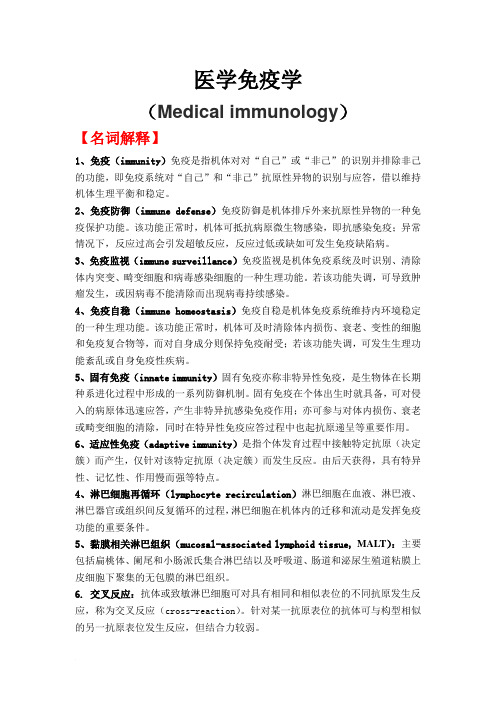
医学免疫学(Medical immunology)【名词解释】1、免疫(immunity)免疫是指机体对对“自己”或“非己”的识别并排除非己的功能,即免疫系统对“自己”和“非己”抗原性异物的识别与应答,借以维持机体生理平衡和稳定。
2、免疫防御(immune defense)免疫防御是机体排斥外来抗原性异物的一种免疫保护功能。
该功能正常时,机体可抵抗病原微生物感染,即抗感染免疫;异常情况下,反应过高会引发超敏反应,反应过低或缺如可发生免疫缺陷病。
3、免疫监视(immune surveillance)免疫监视是机体免疫系统及时识别、清除体内突变、畸变细胞和病毒感染细胞的一种生理功能。
若该功能失调,可导致肿瘤发生,或因病毒不能清除而出现病毒持续感染。
4、免疫自稳(immune homeostasis)免疫自稳是机体免疫系统维持内环境稳定的一种生理功能。
该功能正常时,机体可及时清除体内损伤、衰老、变性的细胞和免疫复合物等,而对自身成分则保持免疫耐受;若该功能失调,可发生生理功能紊乱或自身免疫性疾病。
5、固有免疫(innate immunity)固有免疫亦称非特异性免疫,是生物体在长期种系进化过程中形成的一系列防御机制。
固有免疫在个体出生时就具备,可对侵入的病原体迅速应答,产生非特异抗感染免疫作用;亦可参与对体内损伤、衰老或畸变细胞的清除,同时在特异性免疫应答过程中也起抗原递呈等重要作用。
6、适应性免疫(adaptive immunity)是指个体发育过程中接触特定抗原(决定簇)而产生,仅针对该特定抗原(决定簇)而发生反应。
由后天获得,具有特异性、记忆性、作用慢而强等特点。
4、淋巴细胞再循环(lymphocyte recirculation)淋巴细胞在血液、淋巴液、淋巴器官或组织间反复循环的过程,淋巴细胞在机体内的迁移和流动是发挥免疫功能的重要条件。
5、黏膜相关淋巴组织(mucosal-associated lymphoid tissue, MALT):主要包括扁桃体、阑尾和小肠派氏集合淋巴结以及呼吸道、肠道和泌尿生殖道粘膜上皮细胞下聚集的无包膜的淋巴组织。
医学免疫学名词解释.
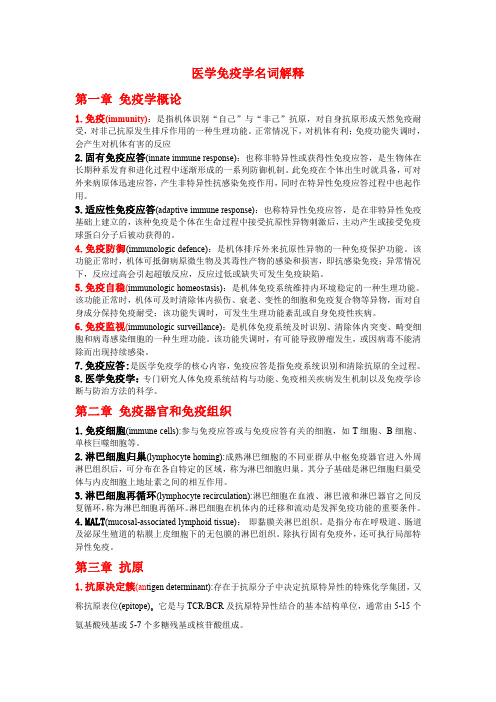
医学免疫学名词解释第一章免疫学概论1.免疫(immunity):是指机体识别“自己”与“非己”抗原,对自身抗原形成天然免疫耐受,对非己抗原发生排斥作用的一种生理功能。
正常情况下,对机体有利;免疫功能失调时,会产生对机体有害的反应2.固有免疫应答(innate immune response):也称非特异性或获得性免疫应答,是生物体在长期种系发育和进化过程中逐渐形成的一系列防御机制。
此免疫在个体出生时就具备,可对外来病原体迅速应答,产生非特异性抗感染免疫作用,同时在特异性免疫应答过程中也起作用。
3.适应性免疫应答(adaptive immune response):也称特异性免疫应答,是在非特异性免疫基础上建立的,该种免疫是个体在生命过程中接受抗原性异物刺激后,主动产生或接受免疫球蛋白分子后被动获得的。
4.免疫防御(immunologic defence):是机体排斥外来抗原性异物的一种免疫保护功能。
该功能正常时,机体可抵御病原微生物及其毒性产物的感染和损害,即抗感染免疫;异常情况下,反应过高会引起超敏反应,反应过低或缺失可发生免疫缺陷。
5.免疫自稳(immunologic homeostasis):是机体免疫系统维持内环境稳定的一种生理功能。
该功能正常时,机体可及时清除体内损伤、衰老、变性的细胞和免疫复合物等异物,而对自身成分保持免疫耐受;该功能失调时,可发生生理功能紊乱或自身免疫性疾病。
6.免疫监视(immunologic surveillance):是机体免疫系统及时识别、清除体内突变、畸变细胞和病毒感染细胞的一种生理功能。
该功能失调时,有可能导致肿瘤发生,或因病毒不能清除而出现持续感染。
7.免疫应答:是医学免疫学的核心内容,免疫应答是指免疫系统识别和清除抗原的全过程。
8.医学免疫学:专门研究人体免疫系统结构与功能、免疫相关疾病发生机制以及免疫学诊断与防治方法的科学。
第二章免疫器官和免疫组织1.免疫细胞(immune cells):参与免疫应答或与免疫应答有关的细胞,如T细胞、B细胞、单核巨噬细胞等。
免疫学重点
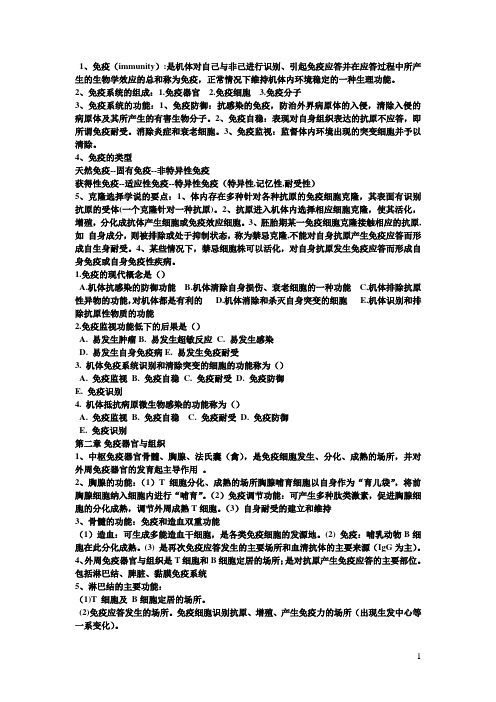
1、免疫(immunity):是机体对自己与非己进行识别、引起免疫应答并在应答过程中所产生的生物学效应的总和称为免疫,正常情况下维持机体内环境稳定的一种生理功能。
2、免疫系统的组成:1.免疫器官 2.免疫细胞 3.免疫分子3、免疫系统的功能:1、免疫防御:抗感染的免疫,防治外界病原体的入侵,清除入侵的病原体及其所产生的有害生物分子。
2、免疫自稳:表现对自身组织表达的抗原不应答,即所谓免疫耐受。
消除炎症和衰老细胞。
3、免疫监视:监督体内环境出现的突变细胞并予以清除。
4、免疫的类型天然免疫--固有免疫--非特异性免疫获得性免疫--适应性免疫--特异性免疫(特异性,记忆性,耐受性)5、克隆选择学说的要点:1、体内存在多种针对各种抗原的免疫细胞克隆,其表面有识别抗原的受体(一个克隆针对一种抗原)。
2、抗原进入机体内选择相应细胞克隆,使其活化,增殖,分化成抗体产生细胞或免疫效应细胞。
3、胚胎期某一免疫细胞克隆接触相应的抗原, 如自身成分,则被排除或处于抑制状态,称为禁忌克隆,不能对自身抗原产生免疫应答而形成自生身耐受。
4、某些情况下,禁忌细胞株可以活化,对自身抗原发生免疫应答而形成自身免疫或自身免疫性疾病。
1.免疫的现代概念是()A.机体抗感染的防御功能B.机体清除自身损伤、衰老细胞的一种功能C.机体排除抗原性异物的功能,对机体都是有利的D.机体消除和杀灭自身突变的细胞E.机体识别和排除抗原性物质的功能2.免疫监视功能低下的后果是()A. 易发生肿瘤B. 易发生超敏反应C. 易发生感染D. 易发生自身免疫病E. 易发生免疫耐受3. 机体免疫系统识别和清除突变的细胞的功能称为()A. 免疫监视B. 免疫自稳C. 免疫耐受D. 免疫防御E. 免疫识别4. 机体抵抗病原微生物感染的功能称为()A. 免疫监视B. 免疫自稳C. 免疫耐受D. 免疫防御E. 免疫识别第二章免疫器官与组织1、中枢免疫器官骨髓、胸腺、法氏囊(禽),是免疫细胞发生、分化、成熟的场所,并对外周免疫器官的发育起主导作用。
- 1、下载文档前请自行甄别文档内容的完整性,平台不提供额外的编辑、内容补充、找答案等附加服务。
- 2、"仅部分预览"的文档,不可在线预览部分如存在完整性等问题,可反馈申请退款(可完整预览的文档不适用该条件!)。
- 3、如文档侵犯您的权益,请联系客服反馈,我们会尽快为您处理(人工客服工作时间:9:00-18:30)。
(A) Passive Humoral (antibodies) o (1) Natural Transfer of antibodies across the placenta or in the colostrum
Rao Dukkipati
Cells of the immune system
Illustration of hematopoiesis
Source: Immunology, Goldsby et al., 5th edition (2002), WH Freeman
Rao Dukkipati
Cells of the immune response
Rao Dukkipati
Antigens/immunogens (contd..)
Antigen-binding site o The part of an antibody that binds antigen Antigenic determinant o A site on an antigen that stimulates an immune response o Also known as an epitope Antigen presenting cell (APC) o A cell that processes antigens and presents the peptides to T-cell receptor Antigen processing o The series of events that happen following antigen injection and antibody formation Antigenic shift o Changes over time in the surface antigens of some viruses
Rao Dukkipati
Mode of action of adjuvants
1. By prolonging the retention of the antigen. 2. By promoting accumulation of immuno-reactive cells at the site of injection and in the draining lymph node. 3. By modifying the activities of cells that are concerned with generating, promoting and maintaining the immune response. 4. By modification of the presentation of the antigen to the immune system.
Rao Dukkipati
Essential features of an antigen
Rao Dukkipati
Factors affecting immunogenicity
Genetic composition of the animal o Species: man or mouse versus guinea pig for polysaccharide
Method of administration
o Dose o Mode: time and number of inoculation
o Route of administration
Adjuvants o A substance that, when administered with an antigen, enhances the immune response of that antigen
Polymorphonuclear leucocytes (granulocytes) o Neutrophils o Eosiniphils o Basophils Monocytes, macrophages and dendritic cells Lymphocytes and natural-killer (N-K) cells
Rao Dukkipati
Tቤተ መጻሕፍቲ ባይዱings to consider when selecting an adjuvant
Routinely used adjuvants have side effects o Granulomas (lumps) at injection site
o Fever
o Arthritis (inflammation of joints) o Anterior uveitis (inflammation of eye structures – iris, ciliary body, etc.) Type of immune response required o Some adjuvants induce antibody responses, while some induce cell-mediated responses
Rao Dukkipati
Ability to differentiate ‘self’ from ‘non-self’
T and B lymphocytes that are able to recognise ‘self’ antigens are usually removed during development Lymphocytes that react with ‘self’ antigens can be supressed by other cells Lymphocytes become unresponsive to activating stimuli – clonal anergy MHC plays a key role in differentiating ‘non self’ from ‘self’ Non response to self antigens is called self tolerance
Once there is a response, the hapten can bind to its antibody
Carrier o An immunogenic macromolecule to which a happen can bound, thus making the hapten immunogenic e.g. albumin Penicillin-albumin complex is responsible for allergy to penicillin in some individuals
Contain two types of enzyme rich granules
o Primary granules – myeloperoxidase, lysosome, elastase, hydrolase, cathepsin o Secondary granules – lysozyme, collagenase, lactoferrin
Rao Dukkipati
Epitope or antigenic determinant
An epitope is a site on an antigen that stimulates an immune response There may be several epitomes in a complex antigen, but immune response to a particular epitope may be predominant – immunodominant epitope Conformational epitopes o Epitopes whose specificity is determined by shape of the antigen molecules Sequential epitopes o Epitopes whose specificity is determined by sequence of amino acids within the epitope
Rao Dukkipati
Antigens/immunogens
Antigen o A molecule that can generate an immune response in an animal o A molecule that can react with pre-formed antibodies or primed Tcells Immunogen
Rao Dukkipati
Some common adjuvants
1. Calmette and Guerin, the French scientists who developed the original BCG vaccine from an isolate of M. bovis in 1906.
o A substance that stimulates a strong immune response when introduced in an animal
The terms antigen or immunogen are often used interchangeably Antigenicity o The ability of a molecule to be recognised by a product of an immune response Immunogenicity o The ability of a substance to induce a detectable immune response
